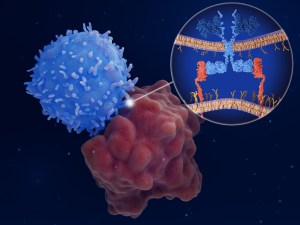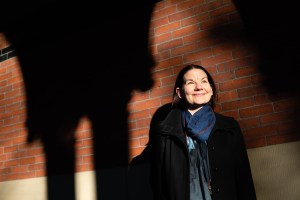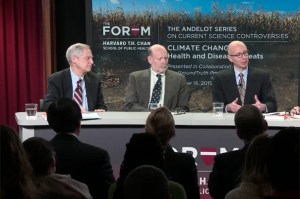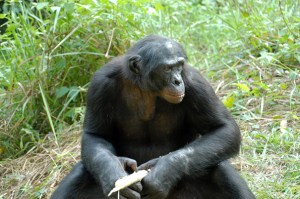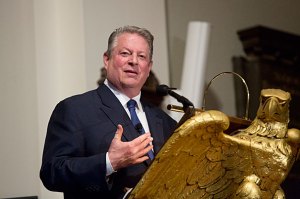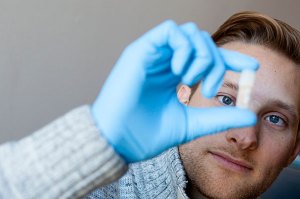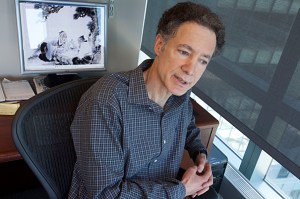Tag: Disease
-
Health
Supreme Court may halt health care guarantees for inmates
Harvard experts on law and policy say originalist view used to overturn Roe could upend the 1976 Supreme Court ruling that requires a minimal standard for inmate health care.

-
Health
What fuels prejudice?
A postdoctoral fellow working in the lab of Psychology Professor Matt Nock,Brian O’Shea is the lead author of a study that suggests racial tension may stem not from different groups being exposed to each other, but fear of a different sort of exposure — exposure to infectious diseases. The study is described in a July…
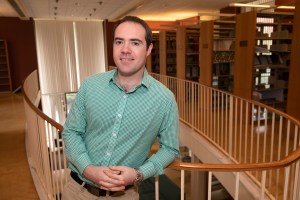
-
Science & Tech
History under the microscope
Researchers delivered lectures on recent findings to launch the Max Planck-Harvard Research Center for the Archaeoscience of the Ancient Mediterranean.
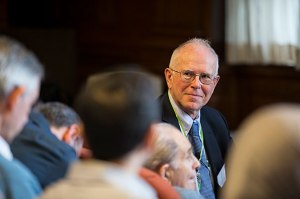
-
Health
For better health, reduce greenhouse gases
The “Harvard Chan: This Week in Health” podcast sits down with Aaron Bernstein, associate director of the Center for Health and the Global Environment at the Harvard Chan School, to discuss how climate change will impact health and health care costs.

-
Health
Sequencing Ebola’s secrets
A global team from Harvard University, the Broad Institute, the U.S. Centers for Disease Control, and other institutions sequenced more than 200 additional Ebola samples to capture the fullest picture yet of how the virus is transmitted and changes over a long-term outbreak.
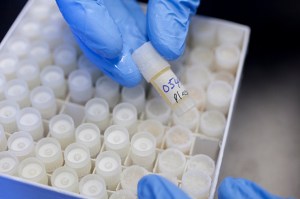
-
Health
A new understanding of Alzheimer’s
Using the principle of natural selection, researchers have outlined a new model of the disease suggesting that mitochondria — power plants for cells — might be at its center.
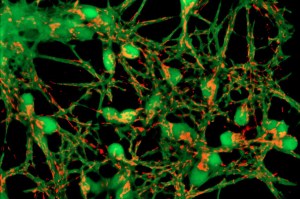
-
Health
Toward genetic editing
Led by David Liu, professor of chemistry and chemical biology, a team of Harvard researchers developed a system that uses commercially available molecules called cationic lipids to deliver genome-editing proteins into cells.
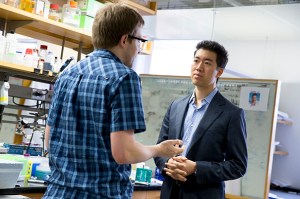
-
Health
Good health lasts later in life
Working from data collected between 1991 and 2009 from almost 90,000 individuals who responded to the Medicare Current Beneficiary Survey, Professor David Cutler has found that, even as life expectancy has increased over the past two decades, people have become increasingly healthier later in life.
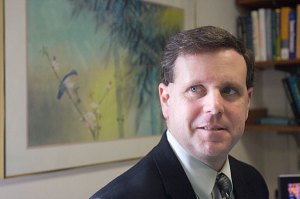
-
Nation & World
Tracking disease in a tent city
At India’s Kumbh Mela, the largest temporary city in the world, public health researchers from Harvard and beyond staged a small but nimble operation to follow health measures and disease outbreaks. The results will hold lessons not just for future Harvard students, but for urban health planners in India and elsewhere.
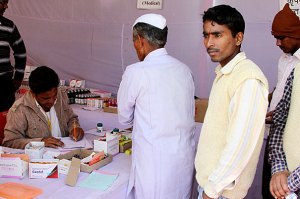
-
Campus & Community
Evans wins Welch Award in Chemistry
David A. Evans, the Abbott and James Lawrence Professor of Chemistry Emeritus, was awarded the 2012 Welch Award in Chemistry in recognition of his pioneering research.
-
Health
Multiple myeloma genome unveiled
Harvard scientists have unveiled the most comprehensive picture to date of the full genetic blueprint of multiple myeloma, a form of blood cancer.
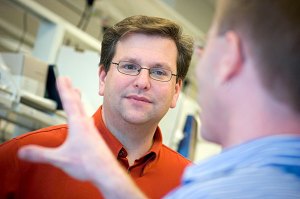
-
Health
Rare find
Researchers at Harvard Medical School and the Harvard School of Dental Medicine have found that by mimicking a rare genetic disorder in a dish they can rewind the internal clock of a mature cell and drive it back into an adult stem-cell stage.

-
Health
It all adds up
New mathematical modeling by scientists from Harvard and other institutions reinforces the view of cancer as a complex culmination of many mutations.

-
Arts & Culture
Saturday Is for Funerals
Max Essex, the Mary Woodard Lasker Professor of Health Sciences, and Unity Dow track the Botswana HIV/AIDS crisis through heartrending narratives of those affected by the disease — an estimated one out of four adults.
-
Campus & Community
Three Harvard scientists named Pew Scholars
Assistant Professor of Stem Cell and Regenerative Biology Fernando Camargo, Assistant Professor of Pathology at Harvard Medical School (HMS) Alexander Gimelbrant, and Sun Hur, assistant professor of biological chemistry and molecular pharmacology at HMS, have been named 2010 Pew Scholars in the biomedical sciences by the Pew Charitable Trusts.
-
Campus & Community
Results of AIDS vaccine trial ‘weak’ in second analysis
In an editorial accompanying the journal paper, Dr. Raphael Dolin of the Beth Israel Deaconess Medical Center in Boston said the overall findings were nonetheless “of potentially great importance to the field of HIV research” because they might yield information about the kinds of immune responses necessary to provide protection against the virus….
-
Campus & Community
A Cancer Visible To The Naked Eye, But Doctors Aren’t Looking
“We were very, very surprised,” Geller recalls. “About three-quarters of them were never trained in the skin cancer exam, and more than half never once practiced the examination during their primary care residency.” Geller, who’s a senior research scientist at the Harvard School of Public Health, says those high levels of inexperience are really worrisome.…
-
Health
From stem cells to heart muscle
A team of Harvard Stem Cell Institute researchers at Massachusetts General Hospital and collaborators at Harvard’s School of Engineering and Applied Sciences has taken a giant step toward possibly using human stem cells to repair damaged hearts.
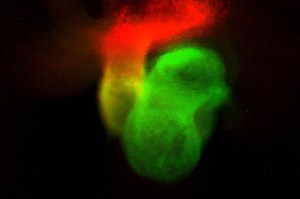
-
Campus & Community
Autism’s genetic roots examined in new government-funded study
Researchers at Harvard University and Children’s Hospital Boston will sequence the genomes of at least 85 people diagnosed with autism in a bid to tease out the genetic basis for some cases of the neuropsychiatric disorder.
-
Campus & Community
Quest for a Long Life Gains Scientific Respect
In mice, sirtuin activators are effective against lung and colon cancer, melanoma, lymphoma, Type 2 diabetes, cardiovascular disease and Alzheimer’s disease, said David Sinclair, a Harvard Medical School researcher and co-founder of Sirtris. The drugs reduce inflammation, and if they have the same effects in people, could help combat many diseases that have an inflammatory…
-
Campus & Community
Lloyd M. Aiello receives Alpert Prize for preventing blindness in diabetic patients
Lloyd M. Aiello, a Harvard Medical School clinical professor of ophthalmology at Joslin Diabetes Center’s Beetham Eye Institute, will receive the 2008-09 Warren Alpert Foundation Prize on Sept. 29.
-
Campus & Community
Around the Schools: Harvard School of Public Health
A new center focusing on mathematical modeling of drug resistance, seasonal infectious diseases, and intervention allocation will be established at the Harvard School of Public Health.
-
Campus & Community
Medical grants a boon for Mass.
Massachusetts biomedical researchers are seeing a windfall from federal stimulus money, with the state receiving more in grants from the National Institutes of Health than all others but California.
-
Campus & Community
H1N1 influenza advice for Commencement week visitors
While at Harvard, should you experience any symptoms consistent with H1N1 flu, you should contact Harvard University Health Services (HUHS).


